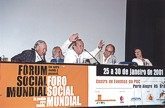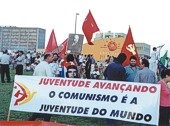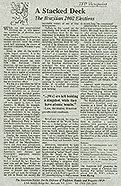
While our own congressional elections are so very important, another set of elections must not be ignored.
On October 6, Brazil will hold its presidential elections. It is not just another election since the results could well determine the course of the entire continent. We need to pay attention.
Brazil is, after all, the world’s eighth largest economy. It is the Latin American powerhouse and our trade with Latin America and the Caribbean exceeds our trade with the European Union. Moreover, our own security rests on the stability of our southern neighbors.
However, we must not think of this as only a matter of economics and self-interest. Brazil is also our valued ally and friend. We cannot wish for our friends a leftist plague that we ourselves abhor.
We live at a time when the left is discredited and demoralized the world over. European and especially French socialists are in disarray. Communist and socialist parties worldwide are recasting themselves and rethinking their unpopular ways.

The hopes of the international left now appear to turn to Latin America. In Brazil, for example, these hopes are highlighted by the fact that there are no centrist or rightist candidates in the running. All four candidates belong to clearly defined socialist or communist parties. José Serra of the Brazilian Social Democracy Party is linked with the Socialist International. Ciro Gomes represents the People’s Socialist Party, the former Brazilian Communist Party. Anthony Garotinho is from the Socialist Party of Brazil.
Finally, the current front-runner is “Lula,” Luiz Inácio Lula da Silva of the Workers Party (PT). This former head of the Metalworkers’ Union and three-time presidential losing candidate is a personal friend and comrade of Fidel Castro, Latin America’s only dictator, and Venezuela’s unpopular caudillo Hugo Chavez.
This is an election where the deck is stacked. By law Brazilians must vote and are fined if they do not. This means they cannot even abstain in protest. Americans must come to realize that October’s results will not mean the triumph of the left in Brazil but merely the inevitable victory of one of four leftist parties.
Telltale in this regard are the consistently low levels of enthusiasm Brazilians show for the way democracy is working for them, as registered by Latinobarometro’s annual polls. This discontent raises disturbing questions about the very survival of the democratic regime. 1

A second conclusion we must take from the elections is the fact that the left will use their Brazilian “victory” as a mandate to oppose American policies and to create friction between our two giant nations.
Even American “progressives” see the Brazilian elections as a watershed “for those who worry about the growing divide between rich and poor, for those who oppose unfettered corporate trade” 2
The end result is that the United States could have in South America a large country systematically opposing its policies and a willing leader of so-called developing nations in a North-South dialectic now brewing.
Brazil was already the stage for two sessions of the World Social Forum, a hodge-podge of leftist movements, guerrilla groups, social activists and anarchists from all over the world, which oppose globalism, capitalism and “neoliberalism.” Lula is a regular at these gatherings where it is customary to burn American flags and brandish Cuban ones.

Moreover, statements by Lula last week at Brazil’s Air Force Club rattled both sabers and nerves when he criticized as “unfair” Brazil’s status under the Treaty on the Non-Proliferation of Nuclear Weapons (NPT) since it leaves “developing nations holding a slingshot while [developed nations] have atomic bombs.” He further railed against American hegemony at the expense of developing nations. “That’s why we had to watch Bush’s speech on TV yesterday trying to find a reason to invade Iraq,” he complained. 3
After October 6, American foreign policy must navigate in these hostile waters. We must have the courage to take strong and controversial stands but the wisdom to avoid pretexts, which will serve as a platform for the left to mobilize against us.
Finally, the left will take advantage of its assured victory to introduce illegitimate social and political reforms inside that vast Christian nation.
Social family issues such as abortion, homosexual civil unions and legalized prostitution are on the agenda.
Extremely stringent gun control laws, outlawing most private guns, are proposed at a time when crime has thrown some cities into a state of siege and individuals are left defenseless.
Socialist and confiscatory land reform and widespread squatter activism will seriously undermine the right of private property and threaten financial stability.
America must encourage the voiceless Brazilians whose Catholic consciences oppose these measures. These wide-ranging reforms will place Brazil on a disastrous leftist path similar to so many other wrongheaded socialist experiments.

The disenfranchised centrist and conservative Brazilian must see America as a friend. He will take heart if we adopt clear principled policies that do not help the left in Latin America. He will rejoice if we refuse to read the socialist script that casts us as an “oppressor” nation.
A weak-willed America will do little to stabilize a continent seething with guerrilla activity, narco-traffic and crime. At stake is more than the future of this youthful and dynamic nation of 180 million people. This election could change the direction of the whole Western hemisphere.

